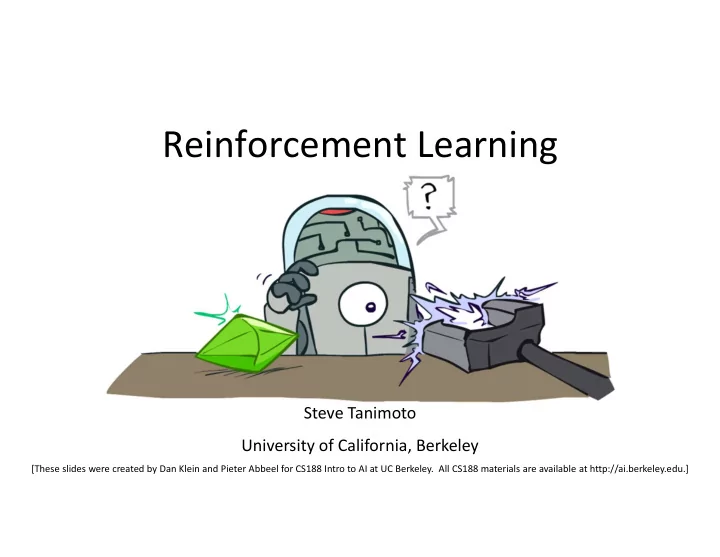

Reinforcement Learning Steve Tanimoto University of California, Berkeley [These slides were created by Dan Klein and Pieter Abbeel for CS188 Intro to AI at UC Berkeley. All CS188 materials are available at http://ai.berkeley.edu.]
Reinforcement Learning
Reinforcement Learning Agent State: s Actions: a Reward: r Environment Basic idea: Receive feedback in the form of rewards Agent’s utility is defined by the reward function Must (learn to) act so as to maximize expected rewards All learning is based on observed samples of outcomes!
Example: Learning to Walk Initial A Learning Trial After Learning [1K Trials] [Kohl and Stone, ICRA 2004]
Example: Toddler Robot [Tedrake, Zhang and Seung, 2005] [Video: TODDLER – 40s]
Active Reinforcement Learning
Active Reinforcement Learning Full reinforcement learning: optimal policies (like value iteration) You don’t know the transitions T(s,a,s’) You don’t know the rewards R(s,a,s’) You choose the actions now Goal: learn the optimal policy / values In this case: Learner makes choices! Fundamental tradeoff: exploration vs. exploitation This is NOT offline planning! You actually take actions in the world and find out what happens…
Detour: Q-Value Iteration Value iteration: find successive (depth-limited) values Start with V 0 (s) = 0, which we know is right Given V k , calculate the depth k+1 values for all states: But Q-values are more useful, so compute them instead Start with Q 0 (s,a) = 0, which we know is right Given Q k , calculate the depth k+1 q-values for all q-states:
Q-Learning Q-Learning: sample-based Q-value iteration Learn Q(s,a) values as you go Receive a sample (s,a,s’,r) Consider your old estimate: Consider your new sample estimate: Incorporate the new estimate into a running average: [Demo: Q-learning – gridworld (L10D2)] [Demo: Q-learning – crawler (L10D3)]
Video of Demo Q-Learning -- Gridworld
Video of Demo Q-Learning -- Crawler
Q-Learning Properties Amazing result: Q-learning converges to optimal policy -- even if you’re acting suboptimally! This is called off-policy learning Caveats: You have to explore enough You have to eventually make the learning rate small enough … but not decrease it too quickly Basically, in the limit, it doesn’t matter how you select actions (!)
Recommend
More recommend